

Regulatory Capture Definition. How Wall Street Killed Financial Reform. Why Are the Fed and SEC Keeping Wall Street’s Secrets? Getting what should be public information about major Wall Street firms can be maddeningly difficult.
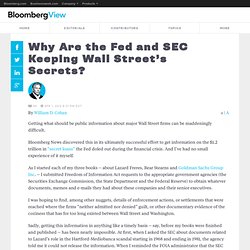
Bloomberg News discovered this in its ultimately successful effort to get information on the $1.2 trillion in “secret loans” the Fed doled out during the financial crisis. And I’ve had no small experience of it myself. As I started each of my three books -- about Lazard Freres, Bear Stearns and Goldman Sachs Group Inc. -- I submitted Freedom of Information Act requests to the appropriate government agencies (the Securities Exchange Commission, the State Department and the Federal Reserve) to obtain whatever documents, memos and e-mails they had about these companies and their senior executives. "Captured Europe" by Simon Johnson. Exit from comment view mode.
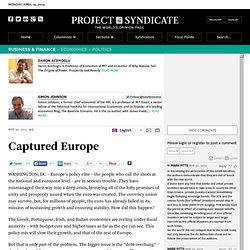
Click to hide this space WASHINGTON, DC – Europe’s policy elite – the people who call the shots at the national and eurozone level – are in serious trouble. They have mismanaged their way into a deep crisis, betraying all of the lofty promises of unity and prosperity issued when the euro was created. The currency union may survive, but, for millions of people, the euro has already failed in its mission of sustaining growth and ensuring stability.
How did this happen? The Greek, Portuguese, Irish, and Italian economies are reeling under fiscal austerity – with budget cuts and higher taxes as far as the eye can see. Terminated CBO Whistleblower Shares Her Full Story With Zero Hedge, Exposes Deep Conflicts At "Impartial" Budget Office. Earlier today, we suggested that in the aftermath of the Greg "Muppets" Smith NYT OpEd, contrary to assumptions by Jim Cramer, a bevy of potential whistleblowers would step up to tell their tale of fraud and corruption across all walks of life - from Wall Street to, far more importantly, Washington, consequences be damned.
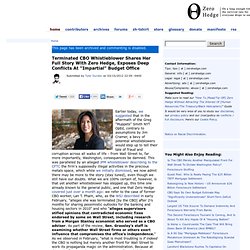
This was paralleled by an alleged JPM whisteblower describing to the CFTC the firm's supposedly illegal activities in the precious metals space, which while we initially dismissed, we now admit there may be more to the story (stay tuned), even though we still have our doubts. What we are 100% certain of, however, is that yet another whistleblower has stepped up, this time one already known to the general public, and one that Zero Hedge covered just over a month ago: we refer to the case of former CBO worker, Lan T.
The Magazine - Financial Regulation. January/ February 2012Financial Regulation Back to the good ol’ days of 2008.
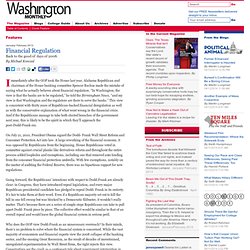
By Michael Konczal. Reckless: The Inside Story of How the Banks Beat Washington (Again) - Jesse Eisinger/ProPublica - Business. One year ago, the largest financial institutions on Wall Street were desperate to show off their strength by paying out, or raising, dividends for the first time since the Great Recession.
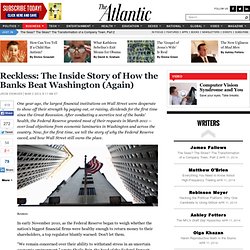
After conducting a secretive test of the banks' health, the Federal Reserve granted most of their requests in March 2011 -- over loud objections from economic luminaries in Washington and across the country. Now, for the first time, we tell the story of why the Federal Reserve caved, and how Wall Street still owns the place. Reuters In early November 2010, as the Federal Reserve began to weigh whether the nation's biggest financial firms were healthy enough to return money to their shareholders, a top regulator bluntly warned: Don't let them.
"We remain concerned over their ability to withstand stress in an uncertain economic environment," wrote Sheila Bair, the head of the Federal Deposit Insurance Corp., in a previously unreported letter obtained by ProPublica. Tarullo is known for his temper. House of Cronies: Is Freddie Mac Incompetent or Corrupt? - James Kwak - Business. It's becoming clear that Freddie Mac offered Bank of America a sweetheart deal in a case that suggests not only incompetence, but also something between cronyism and regulatory capture.
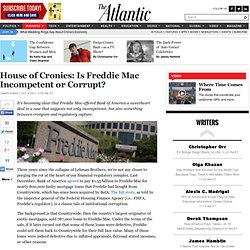
Three years since the collapse of Lehman Brothers, we're not any closer to purging the rot at the heart of our financial-regulatory complex. Last December, Bank of America agreed to pay $1.35 billion to Freddie Mac for nearly 800,000 faulty mortgage loans that Freddie had bought from Countrywide, which has since been acquired by BofA. Bank of America Bosses Find Friend in the Fed: Jonathan Weil.
One of the reasons so many Americans are ticked off at the Federal Reserve is a lingering sense that it puts big banks’ interests above those of ordinary taxpayers.
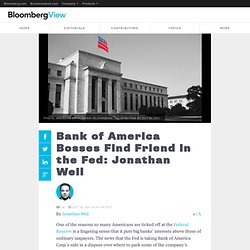
The news that the Fed is taking Bank of America Corp.’s side in a dispute over where to park some of the company’s holdings only reinforces that impression. Here’s the gist of the story, broken two days ago by Bloomberg News. Bank of America, which got hit with a credit-rating downgrade last month by Moody’s Investors Service, has moved an undisclosed amount of derivative financial instruments from its Merrill Lynch unit to its biggest commercial-banking subsidiary. Should Bankers Serve on Federal Reserve Bank Boards? - Daniel Indiviglio - Business. A new GAO report finds conflicts-of-interest present.
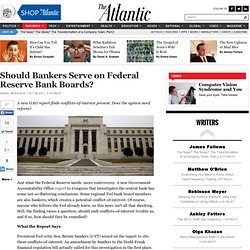
Does the system need reform? What the Report Says Persistent Fed critic Sen. Bernie Sanders (I-VT) seized on the report to cite these conflicts-of-interest. An amendment by Sanders to the Dodd-Frank financial regulation bill actually called for this investigation in the first place. Citigroup stint shadows Obama's new staff chief. President Obama talks with chief of staff Bill Daley and OMB director Jack Lew before announcing that Lew will become his next chief of staff Credit: White House/Pete Souza COMMENTARY Are there any high-minded presidential henchmen out there who haven't worked on Wall Street?
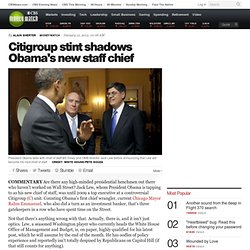
Jack Lew, whom President Obama is tapping to as his new chief of staff, was until 2009 a top executive at a controversial Citigroup (C) unit. Counting Obama's first chief wrangler, current Chicago Mayor Rahm Emmanuel, who also did a turn as an investment banker, that's three gatekeepers in a row who have spent time on the Street. Not that there's anything wrong with that.
Actually, there is, and it isn't just optics. Unlike Daley, a consummate political fixer and former JPMorgan Chase (JPM) executive whom Obama brought on in early 2011 largely to make nice with the corporate community, Lew has a long record as a public servant (if that still counts for anything). Repairing the Damage of “Fraud as a Business Model”
Too Big to Stop: Why Big Banks Keep Getting Away With Breaking the Law - James Kwak - Business. For the country's biggest financial institutions, it's still worth it to break the law, because the government has no way to make the banks pay for acting illegally Reuters Move along, nothing to see here.
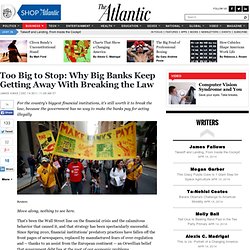
Daron Acemoglu and Simon Johnson: Who Captured the Fed? Daron Acemoglu is Elizabeth and James Killian Professor of Economics at the Massachusetts Institute of Technology and co-author of “Why Nations Fail: The Origins of Power, Prosperity and Poverty.” Simon Johnson is the Ronald A. Kurtz Professor of Entrepreneurship at the M.I.T. Sloan School of Management and co-author of “White House Burning: The Founding Fathers, Our National Debt, and Why It Matters to You.” A hundred years ago, monetary policy – control over interest rates and the availability of credit – was viewed as a highly contentious political issue. Which Bank Is the Worst for America? 5 Behemoths That Hold Our Political System Hostage. October 19, 2011 | Like this article? Join our email list: Stay up to date with the latest headlines via email.
A Fistful of Dollars: Lobbying and the Financial Crisis. Cleaning Up the Capitol. (Sneak peak at our upcoming November issue.) As a fan of Lawrence Lessig's pioneering work on copyright and digital culture, I was saddened when, a few years back, he shifted his focus to congressional corruption and campaign finance. Efforts to take the money out of politicsas opposed to playing the underdog's hand as well as possiblehad long struck me as a sucker's game. Either way, you have to beat the moneyed interests. My skepticism deepened at a dinner where Lessig presented his ideas and, in response to hostile questions, seemed unfamiliar with an extensive academic literature casting doubt on the commonsense theory that campaign contributions buy policy results. Smart people, it turns out, learn a lot from hostile audiences. When Regulators Side With the Industries They Regulate. Simon Johnson, the former chief economist at the International Monetary Fund, is the co-author of “13 Bankers.”
Finance Lobby - Capital City. The Billion-Dollar Bank Heist.